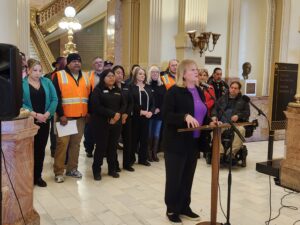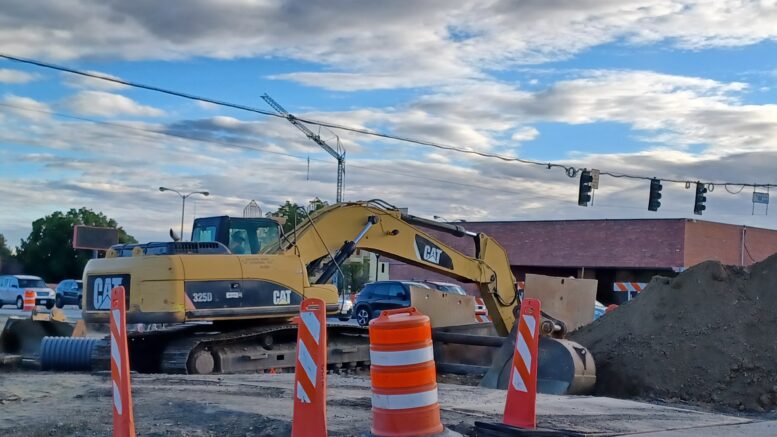As construction companies desperately seek new workers to build homes and infrastructure, Colorado legislators want to ramp up protections to ensure they are paid for their labor, announcing Friday the coming introduction of a bill to crack down further on wage theft.
The proposal — rolled out at a news conference by House Majority Leader Monica Duran, D-Wheat Ridge — largely mirrors a law passed by Denver City Council in early 2023 that allows workers to demand pay from general contractors if subcontractors fail to render full wages. While the Denver law applies to all industries, Duran said in an interview that her bill will focus solely on construction firms as a way to test a new initiative that she believes will spread to other sectors in time.
About 180,000 Colorado residents work in construction — a number that industry leaders are trying to boost to 220,000 by 2027 to meet the demand for new housing and take advantage of available short-term federal funding for roads and other infrastructure. State leaders too are trying to boost sector workforce, including it on a short list of industries in a 2023 law where prospective workers can get tuition-free training and awarding several grants through the Opportunity Now program to develop new pathways into the profession.
At the same time, though, the construction industry has become “polluted with wage theft,” said Mark Thompson, a special representative with the Southwest Regional Council of Carpenters. While some firms fail to pay workers altogether, others fail to pay overtime, fail to pay for the full number of hours that contracted employees work or pay below minimum wage.

Mark Thompson, special representative for the Southwest Regional Council of Carpenters, speaks during a news conference on Friday.
What wage theft bill would do
Like Denver’s law, the bill from Duran and Rep. Meg Froelich, D-Greenwood Village, would let workers filing complaints with regulators — in this case, the Colorado Department of Labor and Employment — seek payment from general contractors who hire negligent subcontractors. That is important, advocates said, because workers have reported instances in which they show up after finishing a job to get their pay and learn that the subcontractor or labor broker has simply dissolved or disappeared, while larger general contractors don’t just go away.
Duran pointed to a Colorado Fiscal Institute report that estimated state workers suffered $728 million in wage theft annually. And she noted that the practice targets lower-wage and Latino-heavy sectors, with Latinos making up 20% of the Colorado workforce but 28% of the workforce in industries like construction that report higher levels of wage theft.
“Those are workers who are living paycheck to paycheck, and missing even one payment can impact their lives and their families,” she said. “This policy is so important for our state, so important for our workers who are trying to provide for our families.”

Colorado House Majority Leader Monica Duran discusses her coming wage-theft bill on Friday at the Capitol.
Contractors worried about specifics of bill
Michael Gifford, advocacy director for the Associated General Contractors of Colorado, said his organization agrees with the premise of the bill and supports penalties against bad actors who purposely skip out on paying workers. But some of the details of the proposal give him pause.
For example, Denver’s law requires complainants who can’t get full payment from a subcontractor to approach next the subcontractor above them — a laddered approach necessary in an industry where larger projects include several layers of subcontractors. But Duran’s bill allows workers aggrieved by a lack of payment from their subcontractor to go directly after a general contractor, and Gifford said that isn’t the best way to solve problems.
Three Denver City Council members attending Friday’s news conference to support Duran’s bill pointed to a Denver Auditor’s Office report noting that it nearly doubled its annual recovery of unpaid wages — from $1.1 million to $2 million in the year after the new law passed. While the law also expanded the office’s ability to recover money from employers violating prevailing-wage and minimum-wage law, those numbers show how much up-the-chain accountability can ensure that workers can recover what they’re owed, Councilwoman Amanda Sawyer said.
However, Gifford argued that only a small percentage of the new cases that the auditor’s office investigated successfully involved a construction firm accused of violations under the new wage-theft law and that most involved minimum-wage and prevailing-wage violations. The auditor’s office clarified to The Sum & Substance that $1.4 million of the recovered 2023 restitution came specifically from wage-theft and minimum-wage laws and noted that violations of minimum-wage law are violations of wage-theft law.
History of wage theft laws
Rather than charging ahead with a new law bolstering civil penalties against firms that may have miscalculated overtime wages due to a worker, Gifford said he’d prefer that CDLE determine first whether it needs more regulations to rein in firms committing intentional wage theft.

Colorado state Rep. Meg Froelich speaks during Friday’s news conference on the proposed wage-theft bill.
“We think this is a pretty drastic change, as opposed to looking at all of those other existing remedies first,” he said. “So, we look forward to having a conversation about this.”
The Legislature passed a law in 2014 giving CDLE the power to adjudicate wage-theft claims and then in 2017 made companies’ wage-theft convictions a public record rather than shielding them as business secrets, as explained in my previous reporting for the Denver Business Journal. It strengthened the law in recent years by allowing felony prosecution of wage theft in 2019 and giving the state more ability to investigate and penalize employers for the crime in 2022 — boosts that Duran referenced in saying she is looking for yet another way to improve the law.
Should bill expand to other sectors?
Despite those efforts to halt wage theft, officials still receive a significant number of complaints alleging the practice, and this demonstrates the need to do more, Froelich said. Two construction workers detailed stories during the news conference of getting paid less than they earned and being threatened with the loss of their jobs if they complained.
Sawyer, a prime sponsor of the Denver law, said she appreciates a provision in Duran’s bill, which the majority leader expects to introduce relatively early in the 2024 session that begins Wednesday, that allows third parties to file complaints with CDLE on behalf of workers. That way, undocumented workers would not have to reveal their identities and risk deportation to recover money, she noted.
In addition to the bill’s specific enforcement mechanisms, there could be debate too over its narrow focus on the construction industry. Duran noted on Friday that 11% of all wage theft occurs in the construction industry, and Gifford later argued that percentage seems too small to merit a sector-specific focus rather than a law encompassing all sectors.
